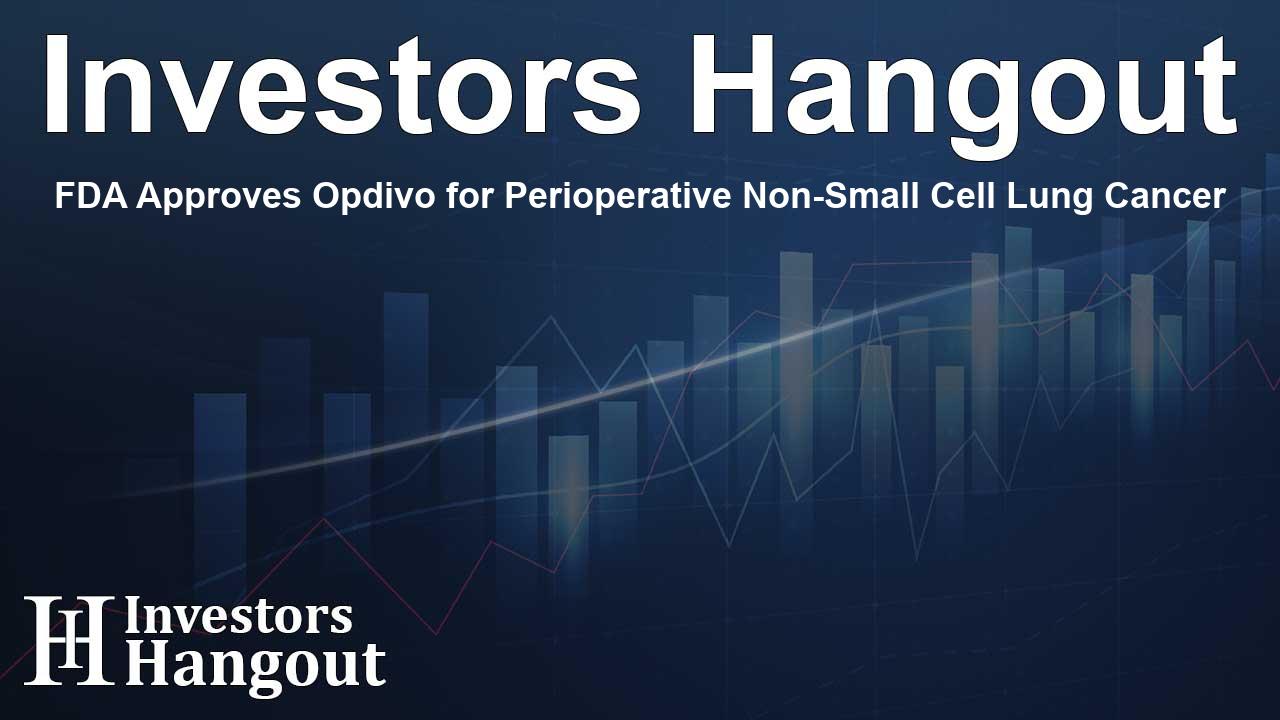FDA Approves Opdivo for Perioperative Non-Small Cell Lung Cancer

FDA Approval for Opdivo in Lung Cancer Treatment
Bristol Myers Squibb (NYSE: BMY) has recently secured significant approval from the U.S. Food and Drug Administration (FDA) for their anti-cancer medication, Opdivo (nivolumab). This approval marks a milestone in the treatment of adult patients with resectable non-small cell lung cancer (NSCLC) who do not have known epidermal growth factor receptor (EGFR) mutations or anaplastic lymphoma kinase (ALK) rearrangements. Utilizing Opdivo in conjunction with platinum-doublet chemotherapy represents a substantial advance in cancer treatment strategies, designed specifically for patients undergoing surgery.
The Importance of Perioperative Treatment
Perioperative therapy refers to medical treatment that is administered before and after surgical procedures. In the case of NSCLC, integrating Opdivo during the treatment regimen can enhance the effectiveness of surgical interventions and subsequently reduce recurrence rates. The FDA's approval affirms that the combination of neoadjuvant chemotherapy followed by Opdivo as an adjuvant treatment can significantly influence patients' event-free survival (EFS).
Understanding the CheckMate-77T Trial
The successful results from the CheckMate-77T trial led to this approval. This large-scale study compared the outcomes of patients who received the Opdivo regimen against those who received only chemotherapy followed by placebo. The results indicated a clear advantage for the combination treatment, demonstrating a 42% reduction in the risk of disease recurrence, progression, or death among the Opdivo-treated patients.
Expert Commentary on Treatment Outcomes
Dr. Tina Cascone, an associate professor of Thoracic/Head and Neck Medical Oncology, expressed optimism regarding this therapy. She highlighted that for patients with resectable NSCLC, this neoadjuvant treatment approach could lead to improved EFS and a higher likelihood of achieving a pathologic complete response (pCR)
Statistically Significant Outcomes from the Trial
According to findings from the CheckMate-77T trial, approximately 70% of patients achieved an 18-month EFS rate when treated with Opdivo, compared to only 50% in the control group. Additionally, a remarkable 25% of those treated with Opdivo achieved a pCR, demonstrating the medication's potential to improve surgical outcomes significantly.
Opdivo's Safety Profile and Treatment Protocol
As with any treatment, there are important safety considerations. Opdivo has been associated with various immune-mediated adverse reactions, including pneumonitis, colitis, and liver issues. Nevertheless, the recommended dosing strategy—360 mg of Opdivo paired with platinum-doublet chemotherapy followed by sustained treatment with Opdivo—encourages effective management of these risks while still aiming for a better patient prognosis.
The Role of Bristol Myers Squibb in Cancer Care
Bristol Myers Squibb continues to pioneer advancements in oncology, as evidenced by their patient-focused initiatives. Their research emphasizes not merely the medical efficacy of treatments like Opdivo but also the holistic care of patients throughout their cancer journey. The company’s commitment extends to making their therapies accessible and manageable for patients, thereby addressing both biological and emotional aspects of cancer treatment.
About Non-Small Cell Lung Cancer
Lung cancer remains the leading cause of cancer fatalities. NSCLC accounts for approximately 85% of lung cancer diagnoses, which emphasizes the significance of advancements in treatment options. Effective treatment strategies may include both neoadjuvant and adjuvant therapies to help prevent recurrence, enhancing the chances of long-term survival.
Frequently Asked Questions
What is Opdivo used for?
Opdivo, or nivolumab, is primarily used in combination with chemotherapy as a neoadjuvant treatment for adults with resectable non-small cell lung cancer (NSCLC).
What does perioperative treatment mean?
Perioperative treatment involves administering therapies before and after surgery to improve surgical outcomes and reduce the risk of cancer recurrence.
What were the results of the CheckMate-77T trial?
The CheckMate-77T trial demonstrated that patients receiving Opdivo experienced a statistically significant improvement in event-free survival compared to those receiving chemotherapy alone.
Who should consider Opdivo treatment?
Patients with resectable NSCLC without known EGFR mutations or ALK rearrangements are potential candidates for Opdivo treatment in conjunction with chemotherapy.
What side effects are associated with Opdivo?
Common side effects may include immune-mediated reactions such as pneumonitis, colitis, and hepatitis. Monitoring patients for these effects is essential during treatment.
About Investors Hangout
Investors Hangout is a leading online stock forum for financial discussion and learning, offering a wide range of free tools and resources. It draws in traders of all levels, who exchange market knowledge, investigate trading tactics, and keep an eye on industry developments in real time. Featuring financial articles, stock message boards, quotes, charts, company profiles, and live news updates. Through cooperative learning and a wealth of informational resources, it helps users from novices creating their first portfolios to experts honing their techniques. Join Investors Hangout today: https://investorshangout.com/
Disclaimer: The content of this article is solely for general informational purposes only; it does not represent legal, financial, or investment advice. Investors Hangout does not offer financial advice; the author is not a licensed financial advisor. Consult a qualified advisor before making any financial or investment decisions based on this article. The author's interpretation of publicly available data shapes the opinions presented here; as a result, they should not be taken as advice to purchase, sell, or hold any securities mentioned or any other investments. The author does not guarantee the accuracy, completeness, or timeliness of any material, providing it "as is." Information and market conditions may change; past performance is not indicative of future outcomes. If any of the material offered here is inaccurate, please contact us for corrections.